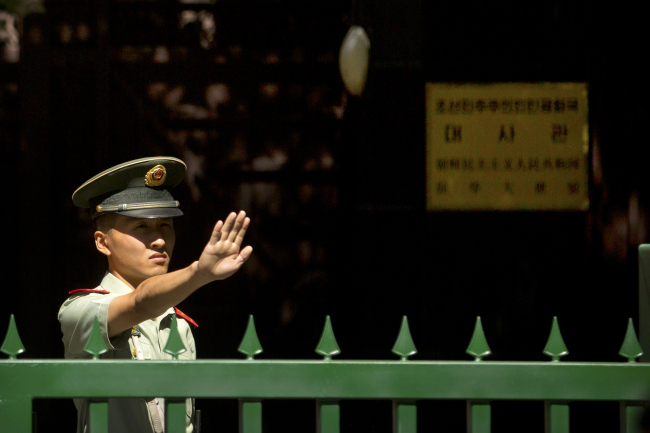[News Analysis] Nuke test to further complicate China’s NK policy
By Yoon Min-sikPublished : Sept. 9, 2016 - 17:39
In the wake of North Korea’s fifth underground blast, China is poised to face ever-intricate challenges in handling its defiant neighbor, with Seoul, Washington and other world powers moving to slap a stifling punishment to contain further advances of its nuclear capabilities.
The test dealt a fresh blow to Beijing which, as Pyongyang’s economic lifeline and sole major ally, has seen growing accusations of not doing enough to curb its nuclear and missile programs as well as military provocations.
Now their decades-old ties are likely to go downhill once again, despite fence-mending efforts since last June’s visit by Ri Su-yong, vice chairman of the North’s ruling party’s central committee and former foreign minister, to Chinese President Xi Jinping in Beijing.

Given the perceived sweeping progress in Pyongyang’s nuclear capabilities, the experiment would help consolidate the logic behind the plan to install a US missile defense system in South Korea, experts and officials say. For Beijing, which deems the program to be directed at it, this could mean its protest losing momentum.
Concerns had soared that China’s opposition to the MD project may lead to a crack in the international community’s united front against the North Korean nuclear programs. After Pyongyang’s test fire of ballistic missiles last month, Beijing virtually thwarted the UNSC efforts to issue a response by insisting on together addressing the Terminal High Altitude Area Defense issue.
“This is indeed a baffling situation for China as North Korea threw cold water over the festive mood following the Group of 20 summit,“ Choi Kang, vice president of the Asan Institute for Policy Studies, said during a seminar in Seoul, referring to the recently ended conference in Hangzhou.
“China has so far maintained a reserved attitude in terms of enforcing North Korea sanctions. But now with the latest test, the atmosphere is leaning toward even stronger sanctions, and it would be hard for China to keep the same stance as before at the UNSC.”
The Chinese Foreign Ministry speedily issued a statement reaffirming its “resolute opposition” to the North’s nuclear development that “disregards” the international community’s warnings.
Beijing will “actively participate” in discussions to be held Friday night in New York by the UN Security Council, it added.
But the newest provocation is also forecast to fuel calls for a turnaround in Seoul’s hardline North Korea policy and fresh measures to bring the wayward neighbor back to the negotiating table.
Facing mounting international pressure, China could reinitiate its proposal for holding denuclearization and peace treaty talks in parallel, highlighting the need to address North Korea’s security jitters.
Seoul, however, has long ditched the idea as far-fetched at least for the time being, demanding Pyongyang first change course or continue to face sanctions and pressure.
“Though China did agree to release a press statement over the missile test earlier this week, a UNSC resolution is a different story so that it could bring up the THAAD issues or the need to reopen the six-party talks or other dialogue,” a Seoul official said.
“Given Seoul’s argument for the THAAD’s conditional stationing, China may suggest peace treaty talks in return for its greater efforts to resolve the nuclear issue, which would pose a challenge to Seoul.”
By Shin Hyon-hee and Yoon Min-sik
(heeshin@heraldcorp.com) (minsikyoon@heraldcorp.com)








![[Kim Seong-kon] Democracy and the future of South Korea](http://res.heraldm.com/phpwas/restmb_idxmake.php?idx=644&simg=/content/image/2024/04/16/20240416050802_0.jpg&u=)








![[KH Explains] Hyundai's full hybrid edge to pay off amid slow transition to pure EVs](http://res.heraldm.com/phpwas/restmb_idxmake.php?idx=652&simg=/content/image/2024/04/18/20240418050645_0.jpg&u=20240418181020)

![[Today’s K-pop] Zico drops snippet of collaboration with Jennie](http://res.heraldm.com/phpwas/restmb_idxmake.php?idx=642&simg=/content/image/2024/04/18/20240418050702_0.jpg&u=)